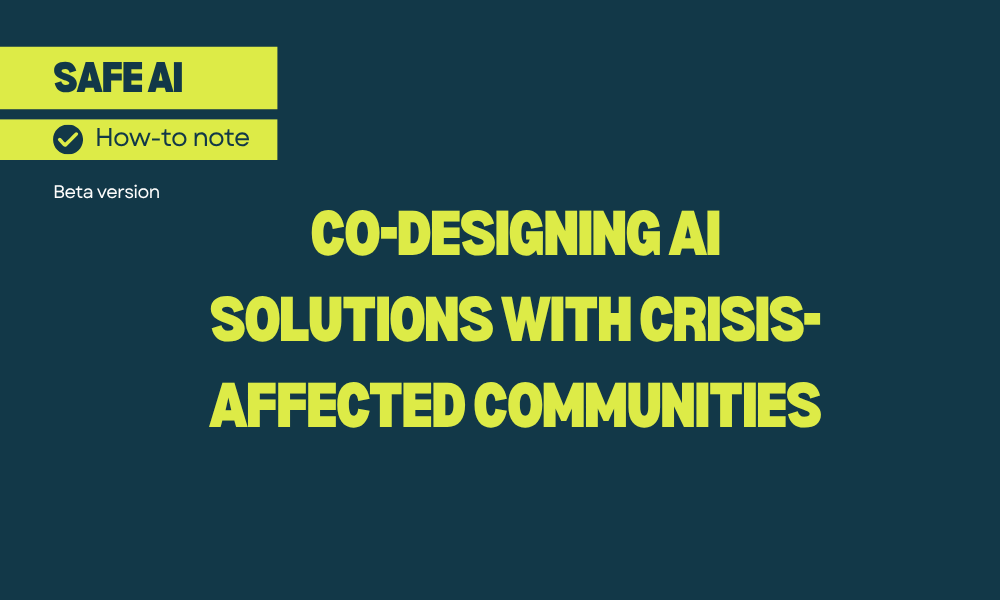Resources
Search our resources
Or filter resources by
Country/region
- Afghanistan 2
- Africa 32
- Americas 3
- Asia 11
- Bangladesh 3
- Belarus 1
- Burkina Faso 3
- Caribbean 7
- Chad 1
- Colombia 3
- Cote D'Ivoire 1
- DRC 1
- Dominica 2
- Ethiopia 3
- Europe 10
- Fiji 6
- Global 57
- Guinea 1
- Haiti 4
- Hati 1
- Horn of Africa 8
- Indonesia 1
- Iraq 1
- Kenya 10
- Libya 1
- Malawi 1
- Middle East 9
- Morocco 2
- Mozambique 4
- Myanmar 3
- Nepal 3
- Niger 2
- Pacific 19
- Pakistan 4
- Palestine 3
- Papua New Guinea 10
- Philippines 6
- Sierra Leone 1
- Somalia 3
- South Sudan 2
- Southeast Asia 7
- Sudan 6
- Syria 3
- Turkiye 3
- Ukraine 6
- Vanuatu 5
- Yemen 1
- Zimbabwe 1
Topic
- #safeai 3
- #safeaihumanitarianengagement 1
- #safeaiparticipation 3
- AI 7
- CDAC Public Forum 13
- COVID-19 12
- DEPP 7
- Digital security 2
- Ebola 1
- Lebanon 1
- Local Lifelines 3
- Myanmar 2
- National Platforms 9
- PSEA 2
- SMS 2
- Sudan 4
- accountability 47
- capacity bridging 15
- cholera 2
- climate 11
- co-design 3
- communication 110
- community engagement 80
- conflict 20
- coordination 51
- cyclone 3
- development 1
- digital 30
- digital hygine 1
- disability 2
- disaster 41
- displacement 14
- drought 3
- earthquake 14
- feedback 7
- financing 5
- floods 3
- harmful information 1
- health 16
- hotline 1
- hurricane 2
- inclusion 11
- information 70
- information integrity 8
- journalism 31
- localisation 28
- media 50
- media development 3
- misinformation 8
- needs assessment 7
How-to note: Co-designing AI solutions with crisis-affected communities (beta)
This how-to note from the SAFE AI Project provides practical guidance for co-designing AI solutions with crisis-affected communities – bridging the divide between humanitarian and technological co-design practices. It aims to improve the delivery of responsible and ethical AI solutions in humanitarian contexts.
Policy brief: Addressing power dynamics in participatory AI for crisis-affected communities (beta version)
This case study from the SAFE AI Project examines real-world challenges in implementing participatory AI through a groundbreaking pilot in Kakuma Refugee Camp and Kalobeyei Settlement.
Co-design vs. User-Centred Design for AI Solutions (Beta version)
This factsheet from the FCDO-funded SAFE AI Project provides practical guidance for humanitarians working with AI to understand two different approaches to participation in AI development.
Building a Responsible AI Framework for Humanitarian Action in a Rapidly Changing Landscape (FCDO Roundtable)
Notes from the UK Government’s Foreign, Commonwealth and Development Office (FCDO) roundtable and soft launch of the FCDO-funded SAFE AI project.
How to spot harmful information in crises
In times of emergency, finding reliable information online can be challenging. This tipsheet offers practical advice to help you identify trustworthy information and avoid misinformation.
Digital communication and accountability: insights from a year of discussions with CDAC Network
Through its public events in 2021, CDAC Network explored digital communication and accountability – in particular, asking how technology could offer a tipping point in shifting the power in aid. This policy brief outlines our key takeaways.
Accountability in the age of the algorithm: championing pathways to inclusion in tech-driven futures
Concept note and background for the 2020 CDAC Network Public Forum.







